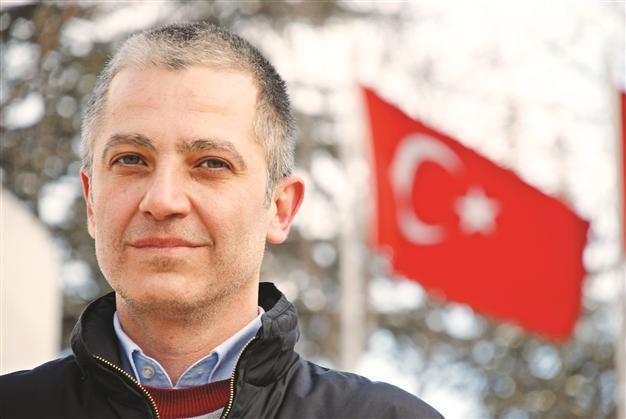BBC documentary questions Turkish Army’s take on gays
EMRAH GÜLER ANKARA - Hürriyet Daily News

Emre Azizlerli made interviews with gay men who have been found exempt by the Turkish Army, and others who are waiting for the army to decide if they will be considered homosexual enough to qualify for exemption.
“Young men are being seen off by their families to go and start their military service, which is compulsory for men in Turkey and is not taken lightly.” So begins “The Pink Certificate,” the BBC World Service’s recent hit radio documentary, which dissects the controversial procedures used to “diagnose” the homosexuality of gay potential conscripts and exempt them from military service: sending them home, instead, with the pink certificate.
The documentary was produced by the BBC’s Emre Azizlerli and Tim Mansel, and is narrated by Azizlerli himself, a Turkish journalist and producer, who came up with the idea for the documentary. He also researched it and arranged interviews with gay men who have been found exempt by the Turkish Army, and others who are waiting for the army to decide if they will be considered homosexual enough to qualify for exemption.
The Turkish Army refused to grant interviews or comments for the documentary, but the documentary also includes an interview with a retired general, as well as a psychiatrist who served in the army and whose duties included diagnosing homosexuality, now considered an outdated practice. “They are taking a huge step into manhood,” Azizlerli narrates, as families see their sons off to the military, and repeats a young man’s words of heated anticipation of the four years of military service ahead of him: “You cannot call a man a man until he goes to the army.”
This is quite the opposite of what one of Azizleri’s interviewees has to say. Gökhan, whose real name is withheld for the documentary, and whose voice is replaced by an actor’s, repeats the word “terrible” so many times within just minutes, it is hard not to feel for him.
The real questionsGökhan recalls how he prepared explicit photographs of himself having sex with another man, having heard that it would be impossible to get out of military service without them. Military doctors granted Gökhan his pink certificate, exempting him from military service. “It’s still terrible,” says Gökhan. “Because someone has those photographs. They could show them to my village, to my parents, my relatives.” It’s not far-fetched to assume that the Turkish army may have a rich collection of gay porn.
“There are many who say that the photo practice is outdated, that it has no place in the modern army,” Azizlerli said, speaking to Hürriyet Daily News and Economic Review. “However, the gay men I have talked to said that both in the past and today (or at least, until last September), the Army arbitrarily continued to ask for photos. Those who have submitted photos stress that the Army wants photos showing them as passive partners.”
Whether one has to go through the degrading and humiliating ordeal of providing photos of one’s private life or not, it is at the very least a problematic practice to set out to diagnose a person’s sexual orientation. “Both scientifically and ethically, modern psychiatry finds it controversial to force people to give detailed accounts of their sexual lives, give them personality tests, or make them stay under observation for days,” Azizlerli said.
Azizlerli directs the issue to the real questions. “The question is not about whether gay men are asked for photographs in sexual intercourse or in women’s clothes. There are two basic questions,” he says.
“Is it possible to prove one’s sexual orientation? And is it compatible with professional ethics for a military doctor to ‘diagnose’ someone as homosexual?”
The issue becomes even more complicated when we consider the army’s definition of homosexuality. “If two soldiers are caught having sexual intercourse, the punishment changes according to the sexual roles of the soldiers. While the exemption process, the so-called pink certificate, begins for the passive partner, the active partner receives a disciplinary punishment. But he doesn’t necessarily have to be expelled,” says Azizlerli.
Homosexuality as a breaking pointAnd what is the right way to approach the delicate issue of gay men in the military? “If the Turkish Army wants to be on the same page with modern psychiatry, it has to accept people’s declaration of their homosexuality and exempt them [based on that],” says Azizlerli. “Or, it can discontinue forbidding homosexuality in the army, and sexual orientation can no longer be a reason for exemption.”
“At present, homosexuality acts as a breaking point for Turkey’s compulsory military service. The picture becomes very complicated when you are trying to intimidate draft dodgers by trying to figure out who is homosexual and who is not,” Azizleri says. Or as Ahmet puts it, “They shouldn’t try and diagnose who is gay and who has a psychosexual disorder.”
REACTIONS ARE POSITIVE
ANKARA - Hürriyet Daily News
“Reactions [to ‘The Pink Certificate’] have been overwhelmingly positive,” says Azizlerli, and the accompanying article “Proving you’re gay to the Turkish army” received more than one million hits when it was posted on March 26.
“I saw that the rest of the world is quite interested in what Turkish gay men are going through.” Azizleri has since given radio interviews in Austria and Ireland, and BBC 4’s documentary program Crossing Continents will run the program in mid-April.
You can listen to the documentary at http://www.bbc.co.uk/iplayer/episode/p00q864h/The_Documentary_The_Pink_Certificate/, or read “Proving you’re gay to the Turkish army” at http://www.bbc.co.uk/news/magazine-17474967.
